Related Research Articles
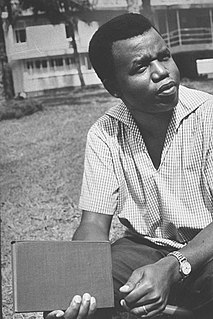
Chinua Achebe was a Nigerian novelist, poet, and critic who is regarded as the dominant figure of modern African literature. His first novel and magnum opus, Things Fall Apart (1958), occupies a pivotal place in African literature and remains the most widely studied, translated, and read African novel. Along with Things Fall Apart, his No Longer at Ease (1960) and Arrow of God (1964) complete the so-called "African Trilogy"; later novels include A Man of the People (1966) and Anthills of the Savannah (1987). He is often referred to as the "father of African literature", although he vigorously rejected the characterization.
Leo Calvin Rosten was an American humorist in the fields of scriptwriting, storywriting, journalism, and Yiddish lexicography.
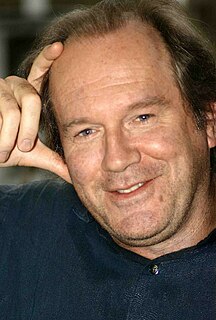
William Andrew Murray Boyd is a Scottish novelist, short story writer and screenwriter.

Bruce Beresford is an Australian film director who has made more than 30 feature films over a 50-year career, both locally and internationally in the United States.
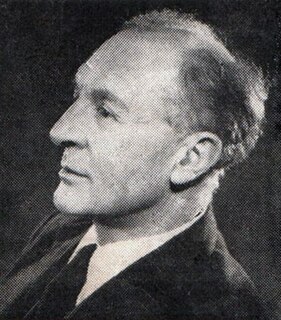
Arthur Joyce Lunel Cary was an Anglo-Irish novelist and colonial official.
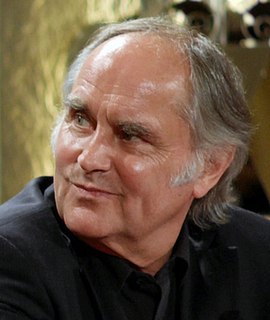
Michael Verhoeven is a German film director.
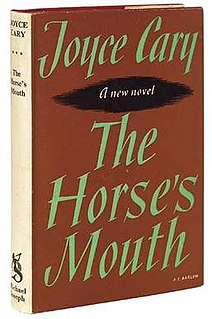
The Horse's Mouth is a 1944 novel by Anglo-Irish writer Joyce Cary, the third in his First Trilogy, whose first two books are Herself Surprised (1941) and To Be A Pilgrim (1942). The Horse's Mouth follows the adventures of Gulley Jimson, an artist who would exploit his friends and acquaintances to earn money, told from his point of view, just as the other books in the First Trilogy tell events from their central characters' different points of view. Cary's novel also uses Gulley's unique perspective to comment on the social and political events of the time.

The Color Purple is a 1985 American epic coming-of-age period drama film directed by Steven Spielberg and written by Menno Meyjes, based on the Pulitzer Prize-winning 1982 novel of the same name by Alice Walker. It was Spielberg's eighth film as a director, and marked a turning point in his career, as it was a departure from the summer blockbusters for which he had become known. It was also the first feature film directed by Spielberg for which John Williams did not compose the music, instead featuring a score by Quincy Jones, who also produced. The cast stars Whoopi Goldberg in her breakthrough role, with Danny Glover, Oprah Winfrey in her film debut, Margaret Avery, Rae Dawn Chong, Willard Pugh, and Adolph Caesar.

The Citadel is a 1938 British drama film based on the 1937 novel of the same name by A. J. Cronin. The film was directed by King Vidor and produced by Victor Saville for Metro-Goldwyn-Mayer British at Denham Studios. It stars Robert Donat and Rosalind Russell.
Stefan Hammarén is a Finnish author who writes in Swedish, belonging to the Swedish-speaking minority of the country. He is the leading Scandinavian surrealist author, language anarchist, poet and text technician. He cannot be placed in any literary tradition, but his novels have recurring aspects of puns and wordplay, dadaistic eagerness and literary puzzles, and contain erotic digressions. His texts are extremely verbose with few visible threads, let alone plot or characterization, and have a distinct embellishment in a baroque pattern, partly with a Shakespearean solemnity. They resemble Joyce's verbal virtuosities in Finnegans Wake.

Mister Johnson is a 1990 American drama film based on the 1939 novel by Irish author Joyce Cary. The film, set in 1929, stars first-time actor Maynard Eziashi as a Nigerian who works as a clerk for the British civil service and adopts the style of the British colonialists in the belief that he is a true Englishman. It was the first American film to be shot on location in Nigeria.

Cry, the Beloved Country is a 1951 British drama film directed by Zoltán Korda and starring Sidney Poitier, Charles Carson and Canada Lee, in his last film role. The film is based on the novel of the same name written by Alan Paton.
Chris Petit is an English novelist and filmmaker. During the 1970s he was Film Editor for Time Out and wrote in Melody Maker. His first film was the cult British road movie Radio On, while his 1982 film An Unsuitable Job for a Woman was entered into the 32nd Berlin International Film Festival. His films often have a strong element of psychogeography, and he has worked frequently with the writer Iain Sinclair. He has also written a number of crime novels, including Robinson (1993).
Maynard Eziashi is a Nigerian-English actor. In 1991, he won the Silver Bear for Best Actor at the 41st Berlin International Film Festival for his starring role in Mister Johnson (1990).
Fada is a town in central Nigeria which is located northeast of Abuja. It is the setting of the 1939 Joyce Cary novel Mister Johnson. Its exact location is latitude 7° 15' 00" N and longitude 4° 04' 00" E.
Norman Rosten was an American poet, playwright, and novelist.

Massey Sahib is a 1985 Hindi drama film directed by Pradip Krishen, starring Raghubir Yadav in the title role. It was Krishen's first film, and was an adaptation of Joyce Cary's 1939 novel Mister Johnson. It won Yadav two international acting awards. The film also stars Arundhati Roy, who was yet to write her first novel and win the Man Booker Prize, along with Barry John and Virendra Saxena.

Tunde Kelani, popularly known as TK, is a Nigerian filmmaker. In a career spanning more than four decades, TK specialises in producing movies that promote Nigeria's rich cultural heritage and have a root in documentation, archiving, education, entertainment and promotion of the culture.

Star Wars: Aftermath is a trilogy of Star Wars science fiction novels by American author Chuck Wendig. Set soon after the events of the 1983 film Return of the Jedi, the series explores the time period between that film and 2015's The Force Awakens. The trilogy began in 2015 with Aftermath, which was followed by the sequels Aftermath: Life Debt (2016) and Aftermath: Empire's End (2017). Aftermath is one of the projects in "Journey to Star Wars: The Force Awakens", a 2015 Star Wars publishing initiative to connect The Force Awakens with previous film installments.
Mister Johnson may refer to:
References
- ↑ "Berlinale: 1991 Prize Winners". berlinale.de. Archived from the original on 15 October 2013. Retrieved 26 March 2011.
- ↑ Fitzgerald, Michael (2015). "A Dream Fulfilled: Michael Fitzgerald". Mister Johnson (DVD). Criterion Collection.